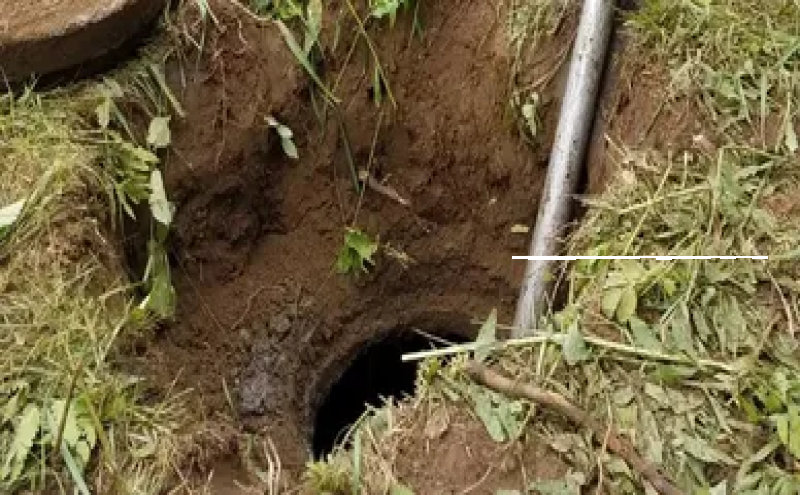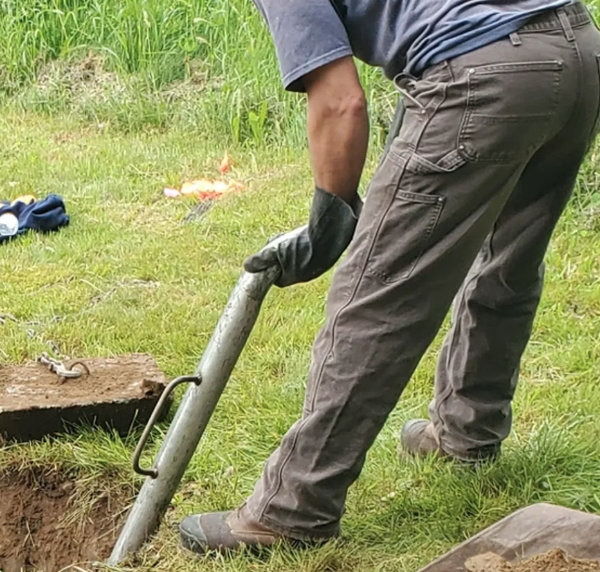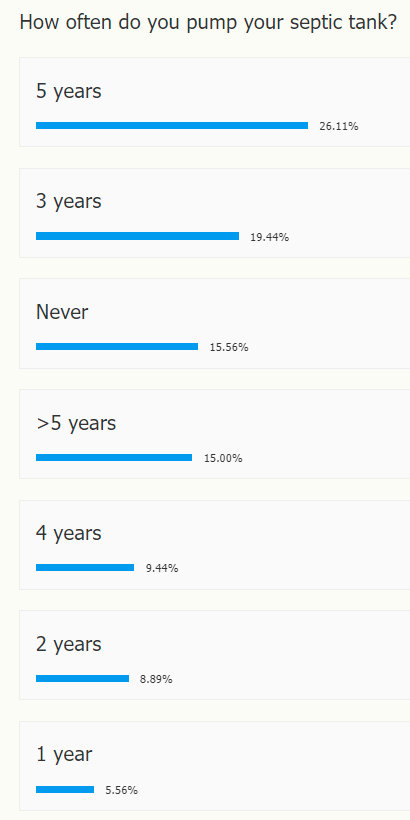How Often To Have Your Septic Tank Pumped Out

Received an email which reads, “I had our septic tank pumped and it was nearly full and it made me think this is one area I have over looked in my preps.”
It sounds like a good topic to me…
I have a septic tank and integrated leach field. Do you live rural? Then you have one too. How often do you have your septic tank pumped out? (I’ll add a poll question in a minute.)
Septic Tank Factors Influencing Pump Out Frequency

Did you know that in a perfect world (we live there, right?) that you would never have to pump out your septic tank? That’s right. Human organic waste by itself will decompose in a septic tank. The resultant brew will eventually work its way into the leach field, and will be absorbed into the earth.
So why do we need to pump out it out once in a while? Well, because some things that get in there don’t decompose in a timely manner (or at all). This turns to sludge. That sludge fills the tank. The septic system itself no longer performs as it should. The tank’s output filter may eventually clog too.
The main reason that septic tanks need to be pumped is because of all the other junk that gets into the tank. The stuff other than from toilets (though toilet “stuff” other than human waste can become a problem too).
Household Size – Septic Tank Usage
First, the obvious. The more people at home, the more stress on the septic system. Ideally the system is designed properly for the expected living conditions of the home. Modern building codes should assure that. However older homes and their septic tanks and leach field systems may be undersized. It’s a possibility.
Grey Water
Grey water. The waste from your kitchen sink, other sinks, the washing machine, everything other than the toilets (black water). That’s the problem. Ideally you would have separate grey water plumbing. It would be plumbed to exit the home and drain in a manner which is separate from the septic system.
The problem… Most jurisdictions will not allow that. Therefore everything from the home (black and grey) ends up in your septic tank for (hopeful) decomposing.
The grey water waste product interferes with the septic tank’s natural “chemistry” of breaking down toilet wastes. It slows it down. Or worse, stops it.
Soaps – Oils
Soaps. Oils. These are the likeliest culprits entering your septic tank that slow it down.
Soaps (from showers, washing dishes, the clothes washer) really cannot be avoided. However maybe the types of soaps that are used would make a slight difference with its effects on septic tank chemistry. Actually, that’s a question. What do you think? We do try and use natural type soaps in general (those with the least extra additives). Maybe it’s all marketing BS. But that’s what we do here at the homestead.
Oils (from resultant cooking with pots and pans, washing dishes). We first use a paper towel to wipe the pan. Absorb as much oil/grease residue into the paper towel. Throw in the trash. Then we’ll clean the pan in the sink. I believe this makes a pretty big difference, eventually. What’s your opinion?
Garbage Disposer
Garbage disposer? No. Probably not a good idea. Although I don’t think it’s a particular problem with many foods (which will naturally organically decompose in the septic tank), it’s a temptation to dump “stuff” into the disposer. Again, greasy oily stuffs… Do you have a septic tank and a garbage disposal in your sink? What are your thoughts on that?
Toilet Paper
Toilet paper. Well, a bidet would mostly eliminate the need for TP. Most of us here in the US don’t have one. It just hasn’t been part of our cultural “cleanup”. Anyway, so is one type of toilet paper better than another for a septic tank? I asked our cleanout guy that question during their last visit. He said, basically all toilet paper will decompose eventually. Just some quicker than others.
This may be marketing BS, but I do look for “septic safe” on my toilet paper packaging. Logically though, the thicker it is, the longer it’s going to take to break down.
As a side note, for our camper which has a toilet and black tank, we are more careful about our TP choice. Plus, there are additive chemicals for those tanks for rapid decomposition treatment.
Okay, back to the question. How often do you have your septic tank flushed / pumped?
UPDATE: The poll results are in. After a few hundred votes…
How Often To Have Septic Tank Pumped? Most people pump out their septic tanks every 5 years. Followed by 3 years.

Septic Tank Treatment
Do any of you use septic tank treatment? If so, which one?
Does septic tank treatment really work? Yes, I believe it does to an extent. It’s probably good insurance, good maintenance to help keep the decomposition process going. I use it, just in case. This one:
>> Green Gobbler (I love the name)
(view on amzn)
I have also used Rid-X. Not sure if one is better than the other…
